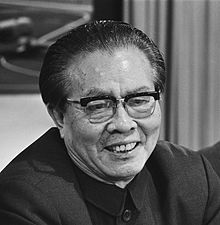Huang Hua (politician)
| Huang Hua | |
|---|---|
| 黄华 | |
 |
|
| Foreign Minister of the People's Republic of China | |
|
In office 1976–1982 |
|
| President | abolished |
| Premier |
Hua Guofeng Zhao Ziyang |
| Preceded by | Qiao Guanhua |
| Succeeded by | Wu Xueqian |
| Personal details | |
| Born |
January 25, 1913 Ci County, Hebei, China |
| Died | November 24, 2010 (aged 97) Beijing, China |
| Political party | Communist Party of China |
| Spouse(s) | He Liliang () |
Huang Hua (Chinese: 黄华; pinyin: Huáng Huá; January 25, 1913 – November 24, 2010) was a senior Communist Chinese revolutionary, politician, and diplomat. He served as Foreign Minister of China from 1976 to 1982, and concurrently as Vice Premier from 1980 to 1982. He was instrumental in establishing diplomatic links of the People's Republic of China with the United States and Japan, and was involved in the negotiations with the United Kingdom over the status of Hong Kong.
Huang Hua was born Wang Rumei in Ci County, Hebei Province in 1913. He was one of the early students at Yenching University in Beijing, where he learned excellent English and developed a close relationship with John Leighton Stuart, the American missionary who founded Yenching.
In 1936, he joined the Communist Party of China at Yenching, and assumed the name Huang Hua. Later that year, he accompanied American journalist Edgar Snow to the Communist base in Yan'an, acting as the interpreter between Snow and the Communist leaders including Mao Zedong. Snow wrote the book Red Star Over China, which introduced the Chinese Communists to the world. Huang Hua remained in Yan'an after Snow left, and worked as an assistant to Marshall Zhu De and later as secretary of Marshall Ye Jianying. He married He Liliang in Yan'an.
After the establishment of the People's Republic of China, Huang's English skills ensured him a position in the newly established Ministry of Foreign Affairs. In the early 1950s, he gained prominence as an effective diplomat. He was involved in the Korean War armistice talks (1953), initial contacts with the United States in Warsaw, Poland (1958), and China's joining of the United Nations (1971).
...
Wikipedia
